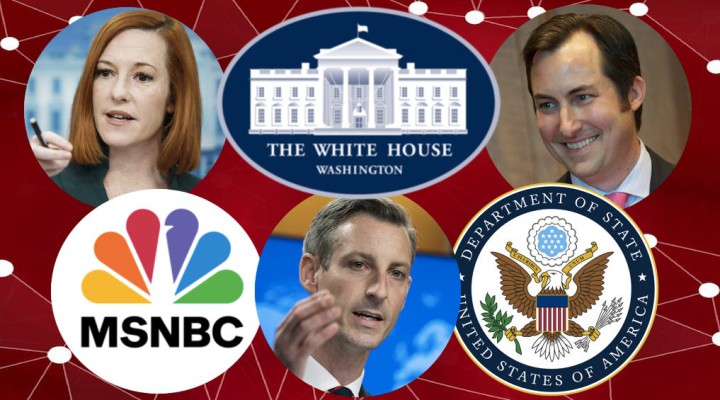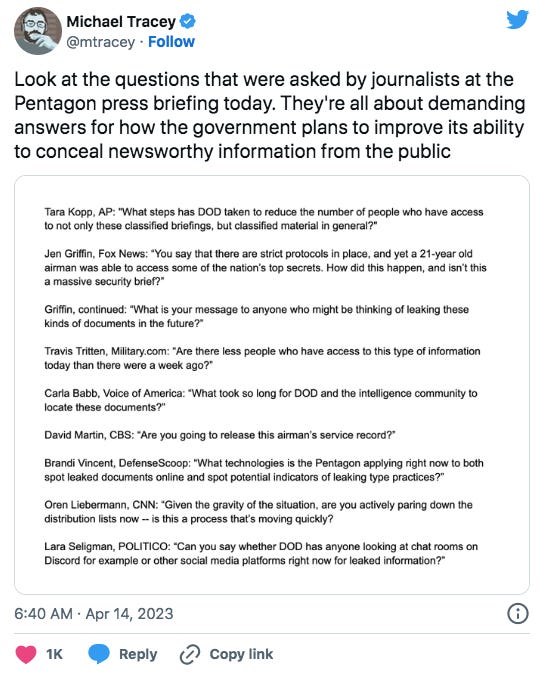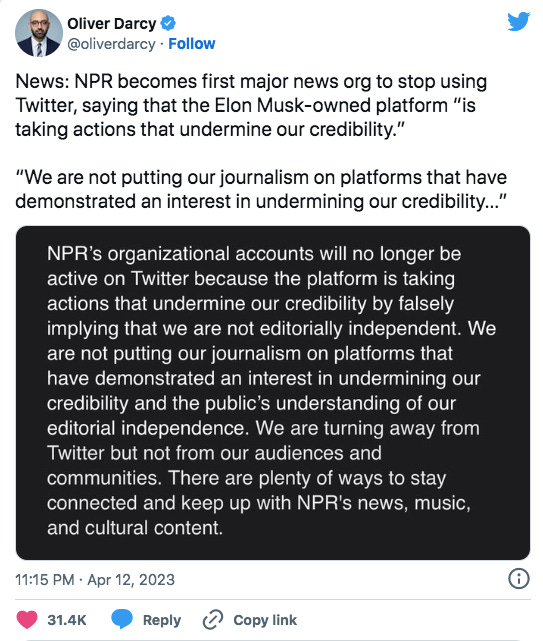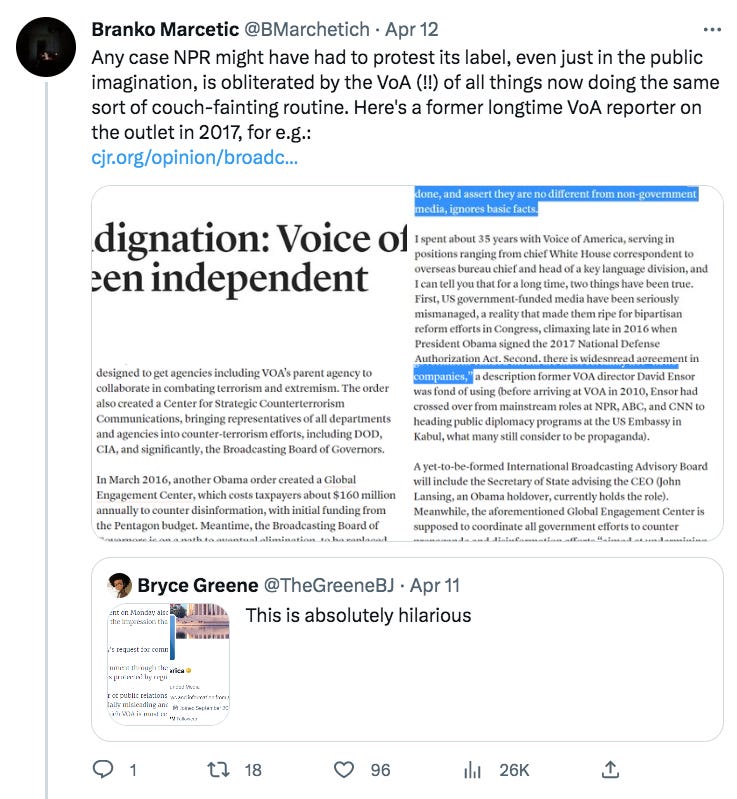The US Could Use Some Separation Of Media And State

Listen to a reading of this article (reading by Tim Foley):
The US State Department’s spokesperson Ned Price is being replaced by a man named Matthew Miller. Like Price, Miller has had extensive prior involvement in both the US government and the mass media; Price is a former CIA officer and Obama administration National Security Council staffer who for years worked as an NBC News analyst, while Miller has previously had roles in both the Obama and Biden administrations and spent years as an analyst for MSNBC.
Like every high-level government spokesperson, Miller’s job will be to spin the nefarious things the US empire does in a positive light and deflect inconvenient questions with weasel-worded non-answers. Which also happens to be essentially the same job as the propagandists in the mainstream media.
In journalism school you are taught that there’s supposed to be a sharp line between government and the press; journalists are meant to hold the government to account, and there’s an obvious conflict of interest there if they’re also friends with government officials or are looking to the government as a potential future employer. But at the highest levels of the world’s most powerful government and the world’s most influential media platforms the line between media and state is effectively nonexistent; people flow seamlessly between roles in the media and roles in the government depending on who’s in office.
We see this indistinctness between government and media with White House press secretaries even more clearly. The current press secretary Karine Jean-Pierre is a former analyst for NBC News and MSNBC, and the last press secretary Jen Psaki now has her own show on MSNBC. Prior to her stint as White House press secretary Psaki worked as a CNN analyst, and before that she was a spokesperson for the State Department like Price and Miller.
At a recent event for the news startup Semafor, Psaki was asked if she considers herself a journalist and she said she does, adding that “to me, journalism is providing information to the public, helping make things clearer, explaining things.” Which is a bit funny considering that Psaki’s political faction has spent the last seven years furiously insisting that WikiLeaks founder Julian Assange is not a journalist. In liberal brainworms land the world’s greatest journalist is not a journalist at all, but Joe Biden’s spin doctor is because she’s got a knack for “explaining things”.
Lest you get the mistaken impression that this phenomenon is unique to Democrats and their aligned media outlets, it should here be noted that Trump’s press secretary Sarah Huckabee Sanders got a job as a Fox News contributor immediately after resigning from that position, and now she’s the governor of Arkansas. Another Trump administration press secretary, Kayleigh McEnany, is now an on-air contributor to Fox News, and previously worked for CNN. Trump’s first press secretary Sean Spicer reportedly tried to get jobs with CBS News, CNN, Fox News, ABC News and NBC News after his stint in the White House, but was turned down by all of them because nobody likes him.
Without any clear lines between the media and the state, US media are not meaningfully different from the state media the west spends so much energy decrying in “tyrannical regimes” like Russia and China. The only difference is that in Tyrannical Regimes the government controls the media, while in Free Democracies the government is the media.
On a related note, journalist Michael Tracey just observed on Twitter that all questions asked during the Pentagon press briefing today about the documents leaked online from the Department of Defense all pertained not to the information contained in those documents, but to the Pentagon’s failure to keep them from leaking to the public. Rather than trying to obtain more information and transparency from their governments as journalists should, they’re actually badgering their government to do more to prevent important information from getting into the hands of journalists.
So I suppose that’s another difference between Totalitarian Regimes and Free Democracies: in Totalitarian Regimes the government instructs the media to suppress inconvenient facts, while in Free Democracies the media instruct the government to suppress inconvenient facts.
As it happens the man who allegedly leaked the Pentagon documents, a 21 year-old National Guardsman named Jack Teixeira, was tracked down and named by The New York Times even before his arrest by the FBI. The New York Times assembled a crew of a dozen reporters to hunt down the leaker, even using contributing reporting from the empire-funded propaganda firm Bellingcat. This job typically undertaken solely by federal agents was undertaken first by reporters from the mainstream press; we’re just a click or two away from New York Times reporters kicking down the doors of people who leak classified information and shooting their dogs like proper feds.
All this while state propaganda outlet NPR continues its ongoing tantrum about Twitter accurately labeling its account “Government Funded”, an upgrade from its also-accurate previous designation as “US state-affiliated media”. NPR has now officially rage-quit Twitter in objection to the label on the basis that “the platform is taking actions that undermine our credibility by falsely implying that we are not editorially independent,” which is hilarious because NPR has no credibility to undermine.
As we discussed recently, NPR receives funding from the US government, consistently promotes the information interests of the US government, and is run by the former CEO of the US government’s foreign propaganda network US Agency for Global Media. It doesn’t even deserve the label “Government Funded”; it should have the exact same labels as Russian and Chinese state media, because it is not meaningfully different from them.
This was made even funnier by the fact that America’s literally state-owned media outlet Voice of America is now standing in very unhelpful solidarity with NPR by also objecting to the “Government Funded” label that has been placed on its own account.
Voice of America writes the following in its own “news” reporting on NPR’s plight:
VOA’s public relations department on Monday also pushed back against Twitter’s decision, saying the label gives the impression that VOA is not an independent outlet.
Twitter did not respond to VOA’s request for comment.
VOA is funded by the U.S. government through the U.S. Agency for Global Media, but its editorial independence is protected by regulations and a firewall.
Bridget Serchak, VOA’s director of public relations, said that “the label ‘government funded’ is potentially misleading and could be construed as also ‘government-controlled’ — which VOA is most certainly not.”
“Our editorial firewall, enshrined in the law, prohibits any interference from government officials at any level in its news coverage and editorial decision-making process,” Serchak said in an email. “VOA will continue to emphasize this distinction in our discussions with Twitter, as this new label on our network causes unwarranted and unjustified concern about the accuracy and objectivity of our news coverage.”
As Branko Marcetic pointed out on Twitter, these claims about VOA’s “editorial independence” have been squarely refuted by someone who worked there for 35 years. In a 2017 article with Columbia Journalism Review titled “Spare the indignation: Voice of America has never been independent,” VOA veteran Dan Robinson says such outlets are entirely different from normal news companies and are expected to facilitate US information interests to receive government funding:
I spent about 35 years with Voice of America, serving in positions ranging from chief White House correspondent to overseas bureau chief and head of a key language division, and I can tell you that for a long time, two things have been true. First, US government-funded media have been seriously mismanaged, a reality that made them ripe for bipartisan reform efforts in Congress, climaxing late in 2016 when President Obama signed the 2017 National Defense Authorization Act. Second, there is widespread agreement in Congress and elsewhere that, in exchange for continued funding, these government broadcasters must do more, as part of the national security apparatus, to assist efforts to combat Russian, ISIS, and al-Qaeda disinformation.
Everywhere you look you can find extensive entanglements between the US government and the news media outlets that westerners look to for information about the world, and that’s before you even get into the way the plutocratic class which owns and influences the US media is also not meaningfully separate from the US government. When corporations are part of the government, corporate media is state media.
It seems a safe bet that the US would be a completely different country if separation of media and state and separation of corporation and state were enshrined like the separation of church and state is.
The only reason Americans consent to the freakish status quo of their government which impoverishes and oppresses people at home while bombing and starving people abroad is because their consent has been manufactured by a media class that is not meaningfully separate from the government. Place the press in their proper place as oppositional scrutinizers of government behavior, and the dynamics underlying the nation’s problems would no longer be hidden from the public.
https://caitlinjohnstone.substack.com/p/the-us-could-use-some-separation
 TheAltWorld
TheAltWorld 




0 thoughts on “The US Could Use Some Separation Of Media And State”